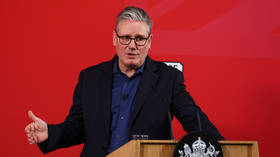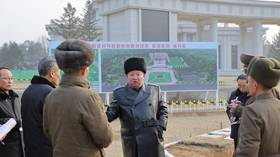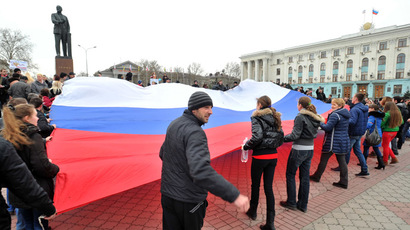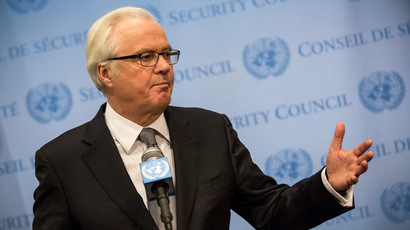Crimea referendum opponents manipulate detached norms of intl law – Churkin
Addressing the chorus of criticism at the UN Security Council meeting on Ukraine, Moscow’s ambassador has reconfirmed that Russia does not want any escalation of the Ukraine crisis and is not interfering with the upcoming referendum in Crimea.
“Russia does not want war and neither do the Russians, and I'm convinced the Ukrainians don't want that either,” ambassador Vitaly Churkin told an emergency meeting of the Security Council on Thursday. “We don’t see any basis to consider the issue in such terms.”
It is unacceptable to reject Crimea’s right for self-determination using a smokescreen of protecting Ukraine’s territorial integrity, without even trying to balance these two principles, Churkin told the council.
“Some dispute the legality of such a referendum, but it is unacceptable to manipulate individual principles and norms of international law, randomly pulling them out of context not only of the international law, but the specific political circumstances and historical aspects,” Churkin said.
In each case, the envoy believes, one should “balance between the principles of territorial integrity and the right for self-determination.”
“It is clear that the implementation of the right of self-determination in the form of separation from the existing state is an extraordinary measure. In Crimea such a case apparently arose as a result of a legal vacuum, which emerged as a result of unconstitutional, violent coup d'état carried out in Kiev by radical nationalists, as well as direct threats by the latter to impose their order on the whole territory of Ukraine.”
Churkin assured the international community that the Black Sea Fleet – the only Russian military force stationed in Crimea according to existing international agreements – does not and will not interfere with Sunday’s referendum on Crimean succession.
“In the conduct of the referendum, organized by the Crimeans, the Russian Black Sea Fleet does not interfere,” he said.
At the same time Churkin reminded about the urgent need to investigate the killings of protesters and security forces at Maidan square that brought new people to power in Kiev. Moscow keeps insisting on setting up a probe into these crimes, Churkin said.
“Acts of violence perpetrated in Kiev need a careful international investigation,” he said, warning that the “image presented by Kiev and western propaganda is completely reversed by the information the same provocateurs were firing at both the representatives of the security forces and protesters.”
“And, according to the latest publishedinformation, shooting came from the headquarters of the so-called ‘Maidan Commandant’, who now heads by the Security Council of Ukraine,” Russia's envoy said.
In general, the UN Security Council members all sides called to abstain from taking positions that could deteriorate the Ukraine crisis. Several member states including the US, Britain and France were critical of Russia’s “actions in Crimea,” while the US ambassador Samantha Power even called for a suspension of the “illegitimate referendum” due to “the background of foreign military intervention.”
Ukraine's coup-appointed prime minister Arseniy Yatsenyuk was also given the floor at the council meeting and used that chance to once again accuse Russia of “military aggression” in Crimea.
“This aggression has no reasons and no grounds,” Yatsenyuk said. “This is absolutely and entirely unacceptable in the 21st century, to resolve any kind of conflict with tanks, artillery and boots on the ground.”
With Western media and the self-proclaimed government in Kiev ranting about the Russian invasion in Crimea, international journalists on the scene are struggling to find any evidence of these claims.
The United States in the meantime has ratcheted up its rhetoric with threats of sanctions against Russia if a referendum in Crimea goes ahead on Sunday.
US Secretary of State John Kerry told a congressional hearing on Thursday that he hoped to avoid such steps, which include sanctions, through discussions with his Russian counterpart, Sergey Lavrov, in London on Friday.
"If there is no sign of any capacity to be able to move forward and resolve this issue there will be a very serious series of steps in Europe and here with respect to the options that are available to us," Kerry said.













